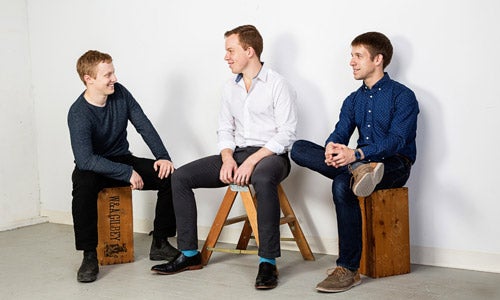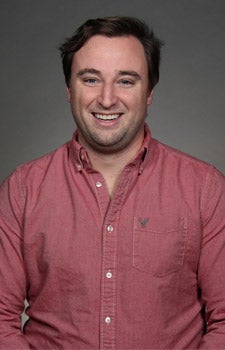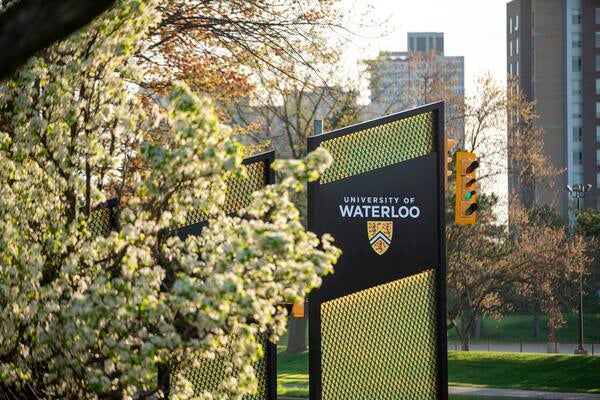
University of Waterloo entrepreneurs on Forbes’ 30 Under 30 list
Waterloo engineers who started companies in their graduating year among young talents named to the Forbes 30 Under 30

Waterloo engineers who started companies in their graduating year among young talents named to the Forbes 30 Under 30
By Nicole Bennett University RelationsUniversity of Waterloo engineering alumni who founded startups in their graduating year have been named to this year's Forbes 30 Under 30 list for innovations in the fields of Consumer Technology as well as Marketing and Advertising.
Mechatronics Engineering graduates and co-founders of Thalmic Labs, Matthew Bailey, Aaron Grant and Stephen Lake, all 27, were named to the prestigious list, along with the co-founder of Vidyard, Systems Design Engineering graduate Devon Galloway, 29.

Bailey, Grant and Lake founded Thalmic Labs in 2012, their graduating year. The Kitchener-based company specializes in wearable technologies that revolutionize the way we interact with computers. Their product, the Myo armband, utilizes gesture and motion control to allow wearers to control devices hands-free. Backed by world-class investors, Thalmic Labs has raised $135 million and has more than 100 employees, with offices in Kitchener and San Francisco.
As the company continues to grow, co-founder and CEO Stephen Lake intends to focus on hiring local talent. In a recent blog post, Lake describes the Waterloo area as a “vibrant and growing community,” advising engineering and computer science graduates to reconsider notions of relocating to Silicon Valley for work.
The Toronto-Waterloo corridor has an incredible amount of momentum right now. Around me, I see a region with the second-highest density of startups in the world continuing to grow." - Stephen Lake
Another Waterloo startup that has seen significant growth in the past year is Vidyard, co-founded in 2010 by Waterloo engineering alumni Devon Galloway and Michael Litt. Vidyard is a video-marketing platform that helps marketing, sales, training and communications professionals achieve business growth through measurable and trackable online video. LinkedIn, Honeywell, Netsuite and Lenovo are among the company’s top clients. The company has received $70 million in funding.
Galloway describes himself as a “Systems Design Engineer by trade and an entrepreneur at heart." Before co-founding Vidyard he worked at Research in Motion for several years, deemed by Forbes a “veteran” of the company.

Both Thalmic Labs and Vidyard worked out of University of Waterloo’s entrepreneurship program, Velocity, during their development. Velocity is the world’s largest free startup incubator, providing entrepreneurial students with free workspace and expert coaching to enable business success.
The Thalmic Labs co-founders and Galloway were named to Forbes’ 30 Under 30 in the Consumer Tech and Marketing and Advertising categories respectively. The list is now in its sixth year, recognizing 30 “game-changers” under 30 years of age across 20 industries, including art and style, technology, education, finance, games, media and more. The selection process is rigorous, condensing more than 15,000 nominations to the final 600.
Founder of Instacart and Electrical Engineering alumnus Apoorva Mehta, named by Forbes as one of America's 40 richest entrepreneurs under 40 in 2016, received a mention on this year's 30 Under 30 list in the All Star Alumni category.

Read more
Here are the people and events behind some of this year’s most compelling Waterloo stories

Read more
The 2025 cohort represents some of the brightest new entrepreneurial minds in STEM

Read more
With AI, manufacturing and green tech-focused companies, Waterloo-linked innovators are scaling businesses for global impact
The University of Waterloo acknowledges that much of our work takes place on the traditional territory of the Neutral, Anishinaabeg, and Haudenosaunee peoples. Our main campus is situated on the Haldimand Tract, the land granted to the Six Nations that includes six miles on each side of the Grand River. Our active work toward reconciliation takes place across our campuses through research, learning, teaching, and community building, and is co-ordinated within the Office of Indigenous Relations.